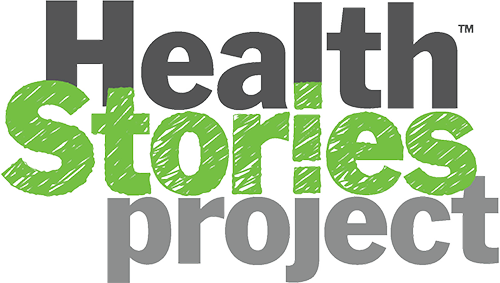Jane Gardner never wanted to become a full-fledged member of “the cancer frequent flier’s club.” Nobody does. Since she was first diagnosed with cancer 20 years ago, Gardner has survived breast cancer, melanoma, ovarian cancer, and lung cancer. And just when she thought she was finally in the clear, her lung cancer recently made a recurrence. Her cancer journey has been turbulent, to say the least.
“It’s odd to always be aware of your own mortality,” says Gardner from her home in Norfolk, Virginia, where she was a well-known TV news anchor for two decades. As a former public personality and health reporter, Gardner knew she wanted to share what she was going through with the world.
“I felt so blindsided when I was diagnosed with ovarian cancer,” she says. “I thought if I could just help one other person not feel blindsided….”



She wishes the teal ribbon signifying ovarian cancer awareness was as famous as the pink one, though she knows all too well that the pink ribbon is ubiquitous because breast cancer affects so many women (one in eight women will be diagnosed with breast cancer; one in 78 with ovarian cancer).
“We’ve made such great strides,” says Gardner, who was diagnosed with breast cancer in 1999. “When my grandmother was diagnosed with breast cancer 50 years ago, the treatment was barbaric. They developed the radical mastectomy because the suffering of women with breast cancer was so horrible that if you cut off the breasts, there was less tissue to become gangrenous.”
Related: What are some struggles people with cancer have that don’t get talked about?
Gardner’s grandmother survived and lived another 13 years, but many women back then weren’t so lucky. “Everyone knows me, so women will come up to me and tell me they had breast cancer,” Gardner says. “There are so many survivors who are living good lives thanks to the advances we’ve made, but the treatments are still rough.”
After surviving breast cancer and aggressive chemotherapy that caused excruciating chronic neuropathy in her hands and feet, Gardner — who says her family tree is rife with various cancers — discovered an odd-looking mole on the underside of her remaining breast in 2009. Her doctor assured her it was probably nothing, but the biopsy brought bad news: It was a melanoma.
“My mother was a nurse,” says Gardner. “All I could think was that they taught her that melanoma had a two-word name: Deadly melanoma. Because back then nobody ever survived it by the time it was diagnosed.”
A skilled plastic surgeon removed the cancerous mole with clean margins and no noticeable disfigurement, and Gardner once again thanked her lucky stars.
Then, in 2015, she started to suffer what she initially thought were the symptoms of IBS, something that had plagued her during chemo treatments. “I was having problems getting clothes to fit over my belly,” recalls the usually slender Gardner, who did some research and made an appointment to get scanned for gallbladder disease. She brought the scans to her next appointment with her internist and was told her belly was full of cancer cells. She had stage 2b ovarian cancer.
“They proceeded to take care of it before I could even process how sick I was,” she recalls. “I had abdominal surgery and chemo. Because I had such severe neuropathy, I had a milder dose once a week instead of the usual strong dose every three weeks.”



Gardner survived once again, but cancer wasn’t done with her yet. In 2016, she was diagnosed with lung cancer. She had the right lower lobe of her lung removed and doctors were confident they got it all. Unfortunately, they were wrong. In 2018, during a routine scan for ovarian cancer, doctors discovered a nodule. Had they done tests like lung nodule icd 10, beforehand, they could have identified the malignancy of the nodule at an early stage and started treatment.
“They went in to do a biopsy and found cancer all along my back chest wall,” says Gardner. “I went to get a second opinion because, for heaven’s sake, it’s lung cancer. The mortality rate is awful for a recurrence of lung cancer.”
She looked up her odds and read that she had nine months to live.
“My friends at Duke, where I had lung cancer treatment, told me not to do that because the published research can’t keep up with the advances in science,” Gardner says. “And here I am. Sure enough it can’t!”
Oncologists opted to leave the nodule in her lung as “a canary in the coal mine.” While she initially struggled with her treatments — one gave her diarrhea so awful that she began to wonder about quality-of-life issues — she has since found one, a daily pill,that she can tolerate. And that canary? “It’s shrunken some on the scans,” she says. “It looks wispy now instead of like a solid pearl.”
Gardner doesn’t know what the future will bring but counts herself fortunate in many ways. She has her husband Gary, who is always by her side. “We’re joined at the hip,” she says. Gardner feels well most days, all things considered, and the couple recently went on a wonderful cruise along the Mediterranean and Adriatic Coasts.
As a trusted public figure — and a platinum member of the cancer frequent flier’s club at this point — she’s also had the unique opportunity to share her story to help others.
“I’ve had 20 years of being aware of just how fragile we are and how important it is to live every day,” says Gardner. “And to always know it might be your last day but not to be gloomy about that. Just be grateful and enjoy it.”


We all love you….for years! Prayers for you. Thanks for sharing your story.
Linda Johnson, Sentara Hospice Nurse